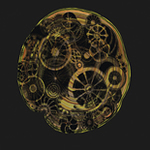|
|
 |
Dusted Reviews
Artist: Mike Wexler Album: Sun Wheel Label: Amish Review date: Nov. 23, 2007 |

|
|
|
 |
Increasingly, it seems as though new underground folk artists have taken the inherently simple requirements of the folk form and used them to make expansive, almost epic statements – Joanna Newsome’s Ys being an obvious example. Mike Wexler follows suit here: Although Sun Wheel contains only eight songs, several clock in well past the seven-minute mark. As is the case elsewhere in the genre, this isn’t always ideal, yet with Wexler it seems somewhat unavoidable given that his multi-faceted compositions do require space to unfurl and build to a climax.
Still, it’s hard not to think that a lot of his best moments would be that much more powerful if the songs were more concise. Take the title song, for example; it contains numerous intriguing musical ideas over its seven minutes and 19 seconds, but none of them really stand out as a clear theme. Individually, they’re all quite lovely, but they don’t really congeal into any sort of mini-suite, and in the end are unjustly forgettable.
That said, when he’s at his best, Wexler has a truly distinct musical style. In particular, his piano lines, which bubble through on nearly every track, give the record a quietly dramatic feel that also manages to resist quaint theatrics on the one hand and flower child bombast on the other. On the near nine-minute “Southern Cross,” Wexler uses a dual piano-guitar line that trades off on major and minor melodic themes (strangely recalling the stateliness of the carol “The Little Drummer Boy”), and drives the song toward a breathtaking apex.
Although musically and compositionally Wexler is both more ornate and traditionally pop-oriented than Baltimore punk/folk shaman and Lungfish singer Daniel Higgs, his recent solo work isn’t an inappropriate reference point for Wexler’s own. The two share a similar vocal style, one that is unconventional yet affecting, and gives their respective work a beautifully eerie quality. Wexler’s lyrics have the same inspired surrealistic tone of Higgs’s, and they both like to draw out their songs in length as they see fit. Yet where Higgs really does often seem like a vessel for inspiration from elsewhere, letting a simple idea drone on until it reaches the sublime (or returns to whence it came, for that matter), Wexler very decisively jumps from idea to idea. It feels almost too scripted, undermining an otherwise very organic record.
Wexler certainly has the ability to write a beautiful melody, evidenced by, if nothing else, the fact that each of the songs here contains about five to 10 of them each. There’s nothing wrong with sprawling, complex albums, but I’d love to hear what would happen if Wexler chose just one theme or, hell, even two or three, and gave them the room they needed to truly flower.
By Nate Knaebel
|







